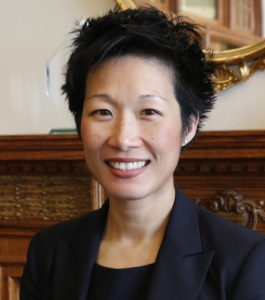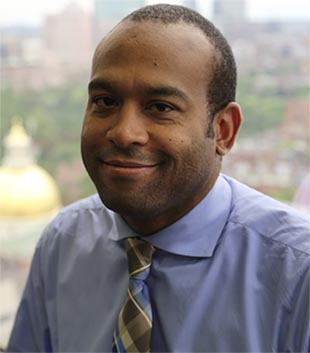 Iraida J. Álvarez, Esq.
Iraida J. Álvarez, Esq.
Chair, effective April 1, 2024
Designee of the Commissioner, Department of Elementary and Secondary Education
Iraida J. Álvarez currently serves as the Acting Executive Director of Special Education at DESE where she oversees the offices of Special Education Planning and Policy, Public School Monitoring, Problem Resolution Systems, Approved Private Special Education Schools and Special Education in Institutional Settings. In that capacity, she sets policy and programs in support of the state’s work on behalf of students with disabilities. Prior to that role, she was Chief of Staff to DESE Commissioner Jeffrey C. Riley and Associate General Counsel at DESE’s legal office.
Before joining DESE, Ms. Álvarez was an Assistant Attorney General in the Administrative Law Division of the Massachusetts Attorney General’s Office where she represented state agencies in litigation matters in state and federal courts. Prior to that, she worked in private practice at Goodwin Procter and was a law clerk to the Honorables Ruth I. Abrams and Robert J. Cordy of the Massachusetts Supreme Judicial Court. She is a graduate of Boston College Law School and Princeton University.

Deborah B. Goldberg
Treasurer, Commonwealth of Massachusetts
Chair, Pension Reserves Investment Management Board (PRIM );
Chair, State Retirement Board; and
Teachers’ Retirement Board member since January 21, 2015
Deborah B. Goldberg is the Massachusetts State Treasurer and Receiver General. In that role she is responsible for the state’s cash and debt management, unclaimed property, and chairs state boards and commissions, including the Massachusetts School Building Authority, the Pension Reserves Investment Management Board, the State Board of Retirement, Massachusetts State Lottery Commission, and the Massachusetts Clean Water Trust. In 2015, she established the new Office of Economic Empowerment, the first of its kind in the country, and chairs its Economic Empowerment Trust Fund. Treasurer Goldberg also serves on the Executive Committee of the National Association of State Treasurers.
As a former businesswoman and local elected leader, Treasurer Goldberg brings innovative leadership, disciplined fiscal management and an unwavering commitment to uphold economic stability and create opportunity for every Massachusetts resident. Treasurer Goldberg served for six years on the Brookline Board of Selectmen, including two as its Chair. Prior to her career in public service, she worked in retail operations, buying, and consumer affairs at The Stop & Shop Companies, Inc.
Treasurer Goldberg is the President of Adoptions with Love and serves on the Advisory Board of the Greater Boston Food Bank. She was one of the founders of Berkshire Hills Music Academy, a school for individuals with intellectual disabilities, and is a trustee at Beth Israel Deaconess Medical Center, a Director at Affiliated Physicians Group/BIDHC. Treasurer Goldberg has been actively involved with numerous philanthropic activities, including The Grow Clinic, the 100 Club, Planned Parenthood League of Massachusetts, and the Combined Jewish Philanthropies.
A graduate of Boston University, Boston College Law School and Harvard Business School, Ms. Goldberg lives in Brookline with her husband Michael Winter and their son, Evan, and daughter, Meredith.
 Sarah G. Kim
Sarah G. Kim
General Counsel | Deputy Treasurer, State Treasurer’s designee
Appointed March 2, 2023
Sarah G. Kim is a Deputy Treasurer and General Counsel for the Office of the Massachusetts State Treasurer & Receiver General. As a Deputy Treasurer, Ms. Kim has general oversight of the Alcoholic Beverages Control Commission. As General Counsel, Ms. Kim manages the team that provides support to the Treasury and its affiliated agencies on various legal issues, including the open meetings, ethics, and public records laws. Ms. Kim also advises senior staff on strategic policy, procurement, employment, and litigation issues. From May to August 2023, Ms. Kim was appointed Chair of the Cannabis Control Commission on an interim basis. In the role, Ms. Kim chaired the monthly Commission meetings and led internal efforts to formalize governance and other procedures.
Before joining the Treasury, Ms. Kim was an Assistant Attorney General in the Fraud and Financial Crimes Division of the Office of the Massachusetts Attorney General. Prior to that, Ms. Kim was an attorney in the litigation practice group of Bingham McCutchen LLP (now Morgan, Lewis & Bockius LLP), where her practice focused on federal and state securities-related matters. Ms. Kim is a graduate of the Villanova University School of Law and Dartmouth College.

Diana DiZoglio
Auditor, Commonwealth of Massachusetts
Teachers’ Retirement Board member
Since January 18, 2023
Auditor Diana DiZoglio is the 26th Auditor of the Commonwealth of Massachusetts. She was sworn into her first term on January 18, 2023. She is committed to help move Massachusetts forward by working to increase transparency and accountability in state government. Auditor DiZoglio is a former State Senator (1st Essex District), State Representative (14th Essex District), and chief of staff to the president of the Professional Fire Fighters of Massachusetts. Her decade-long service on Beacon Hill has provided her with the insight and fortitude to work alongside elected officials, labor, community advocates, stakeholders and everyday working people throughout the Commonwealth’s cities and towns. Her humble beginnings, non-profit work and labor experience helped her nurture, cultivate, and develop relationships with a diverse expanse of people. Auditor DiZoglio began her public service in state government in 2013, serving as a state representative for the 14th Essex district, which includes portions of North Andover, Methuen, Lawrence and Haverhill. She is a graduate of Wellesley College and Middlesex Community College. She is a resident of Methuen, where she grew up.
 Michael Leung-Tat
Michael Leung-Tat
General Counsel | Deputy Auditor, State Auditor’s designee
Appointed December 8, 2021
Michael Leung-Tat serves as the Office of the State Auditor’s (OSA) General Counsel and Deputy Auditor. Leung-Tat oversees the OSA’s legal affairs, as well as the agency’s Bureau of Special Investigations (BSI) and Division of Local Mandates. From 2017 to 2019, he served first as Legal Counsel for BSI before joining the OSA Legal department as Assistant General Counsel. Prior to returning to the OSA, he served as Deputy Division Chief in the Massachusetts Office of the Attorney General’s Fair Labor Division and was Assistant Corporation Counsel in the City of Boston’s Law Department for the Boston Public Schools. He earned his Juris Doctor from the Benjamin N. Cardozo School of Law in New York City and received his bachelor’s degree from Yale University.

Dennis J. Naughton
Elected by the Membership
Term expires December 31, 2027
Board-elected member to the PRIM Board
Dennis Naughton was elected to the Board in December 2011. He began his career as a public school educator in the Millis Public Schools in 1968, where he served as a high school social studies teacher for 33 years, as well as social studies department head and golf coach. During that time he served on the New England Association of Schools and Colleges (NEASC) evaluating teams at Concord-Carlisle Regional High School, Manchester High School (now Manchester Essex High School) in Manchester-by-the-Sea, and University Park Campus School in Worcester. He served as principal of Millis High School from 2001 to his retirement in 2004.
From 1977 to 1997, Mr. Naughton served as president of the Millis Teachers Association. He also served several terms on both the Board of Directors and Executive Committee of the Massachusetts Teachers Association . Since his retirement, he served as interim assistant principal at Norton High School in 2005-2006, and as interim principal at Douglas High School in 2009.
Mr. Naughton is actively involved as a retired life member of the Massachusetts Teachers Association and the National Educational Association. He holds an A.B. in History from Saint Anselm College and an M.A.T. in History from Assumption College. Mr. Naughton resides in Foxborough.

Jacqueline A. Gorrie
Elected by the Membership
Term expires December 31, 2027
Jacqueline Gorrie was elected to the Board in December of 2015. Jackie began and ended her 36 year teaching career in the Taunton Public Schools as a Second Grade teacher and a Kindergarten Teacher.
As a lifelong public school educator, Jackie’s advocacy for her profession and her students led her to many leadership roles within her Union. Locally, she served as the Public Relations and Political Action Chairperson, the Secretary, Vice President/ Grievance Chairperson and President of the Taunton Education Association. Her community activism led her to her state and national activism as a member of the Massachusetts Teachers Association Board of Directors and subsequently as a member of the National Education Association Board of Directors.
Currently, Jackie represents retired members of the Massachusetts Teachers Association on the MTA Board of Directors and is a member of the MTA Retired Members Committee. She is also on the Finance Committee and the St. Vincent De Paul Committee for her parish.
A resident of Randolph, Jackie continues to be an active advocate for retiree issues in both the MTA and NEA. Jackie holds a BA from Bridgewater State College and an M.ed from Cambridge College.

Richard L. Liston
Appointed by the Board
Term expires January 31, 2028
Appointed to the Board in January 2012, Mr. Liston was a special education teacher in the Everett Public Schools for 40 years and served as the president of the Everett Teachers Association for 27 years. He currently represents retired members of the Massachusetts Teachers Association on the MTA Board and is co-chair of the MTA Retired Members Committee. Mr. Liston holds a B.A. and M.A. in special education from Fitchburg State University.

Anne Wass
Appointed by the Governor
Anne Wass, former president of the 107,000-member Massachusetts Teachers Association, is a champion of students, public schools and public higher education.
Mrs. Wass has spent all of her adult life in public education and has served in many leadership positions. She taught sixth grade at the Hanover Middle School for 31 years. She has served on the MTA Board of Directors and state Executive Committee, and she has been president of her local association in Hanover at two different times. Mrs. Wass was MTA president from 2006 until 2010. Before taking office as president, she served as the association vice president for four years.
Teaching is Mrs. Wass’ passion, and she has won a number of awards honoring her abilities as a teacher. These awards include the Bristol County Educators’ Association Kathleen Roberts Human Relations Award, the Plymouth County Education Association’s Honor Award and the Loretta Quinlan Award, the highest honor bestowed by the PCEA. She also won the first MTA Friend of Labor Award and the Louise Gaskins Lifetime Civil Rights Award. She received the Salem State University Friend of Education Award in 2010.

 Iraida J. Álvarez, Esq.
Iraida J. Álvarez, Esq.
 Sarah G. Kim
Sarah G. Kim
 Michael Leung-Tat
Michael Leung-Tat




